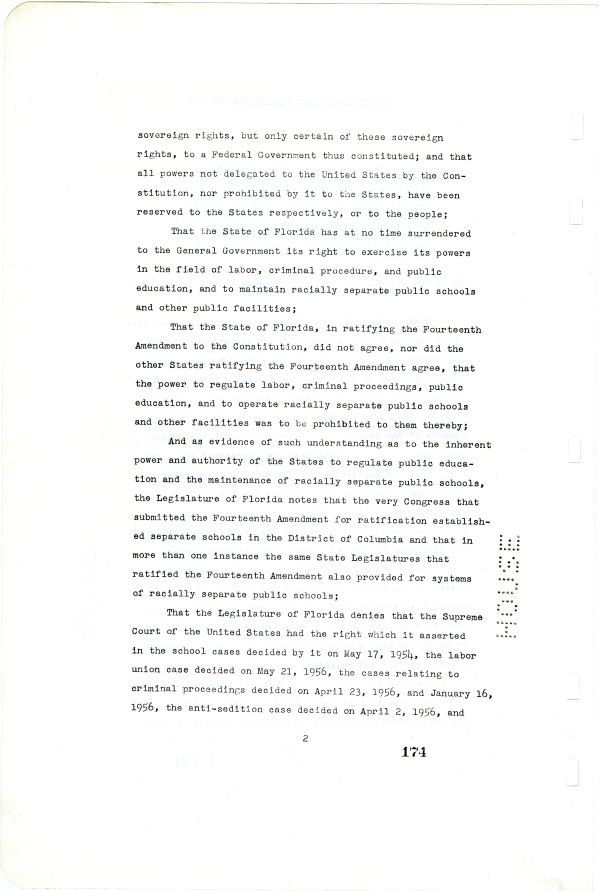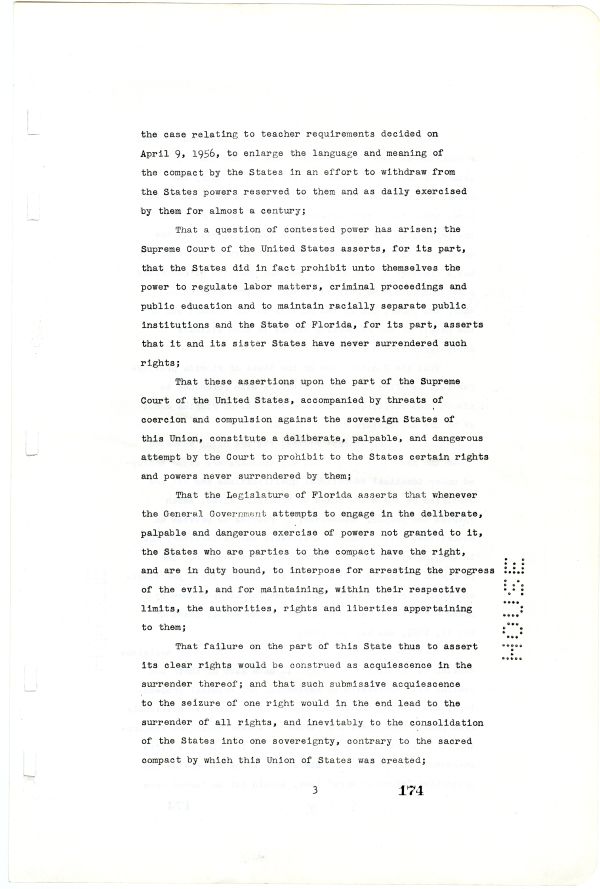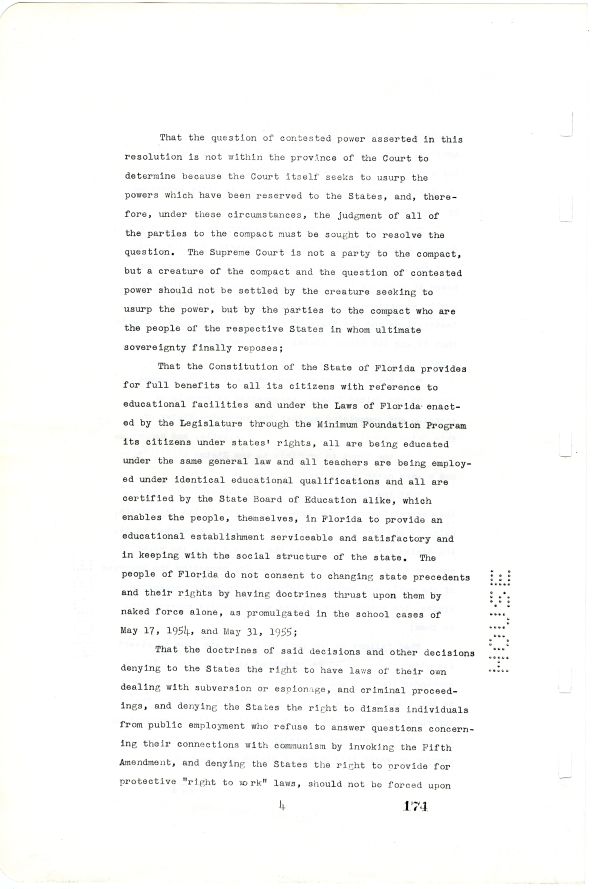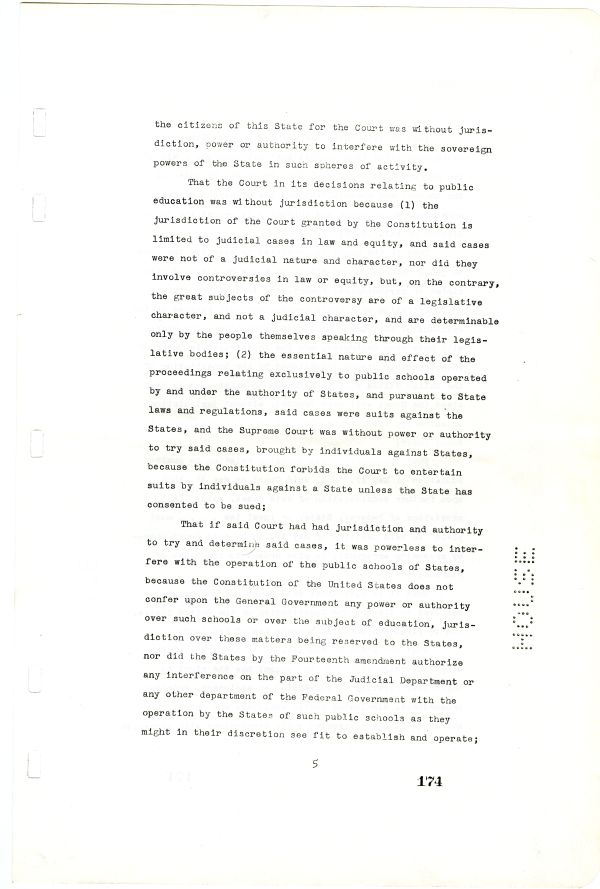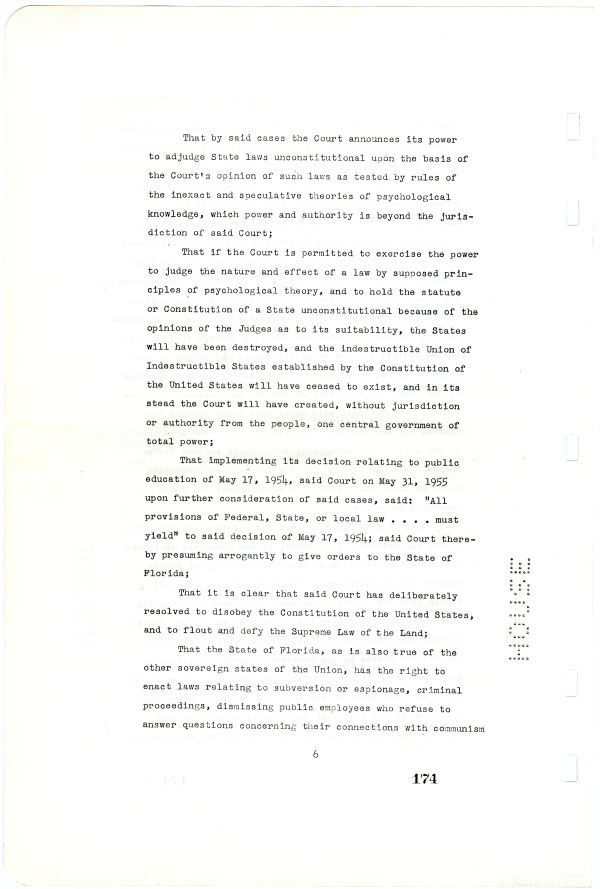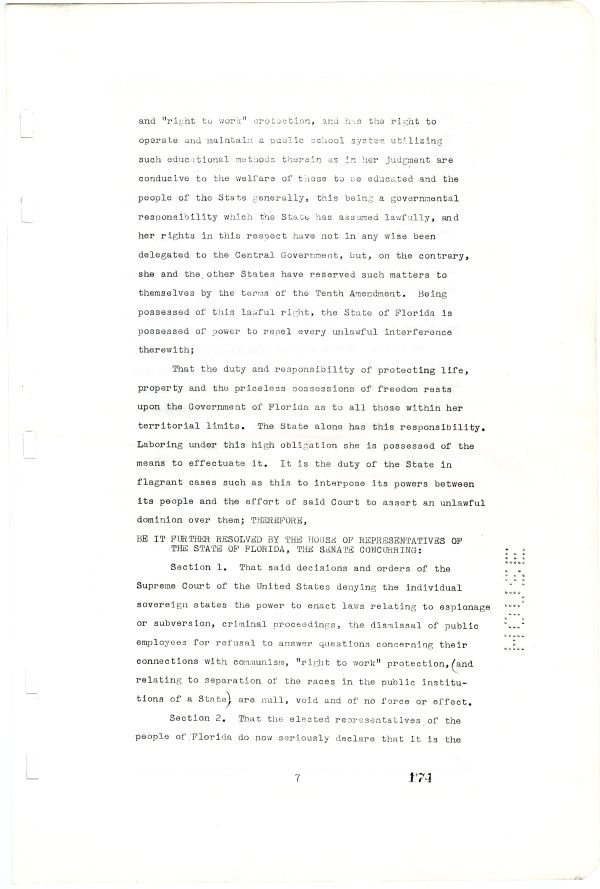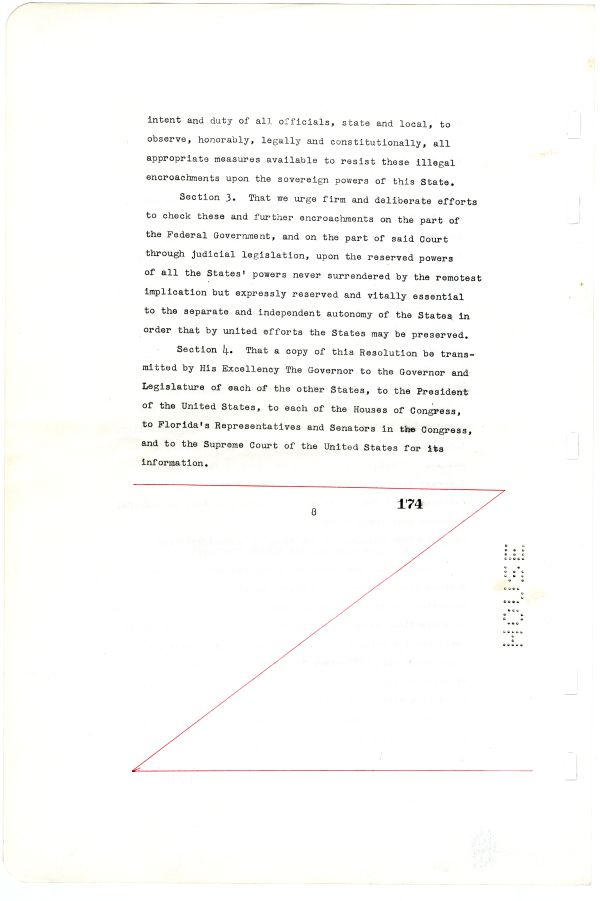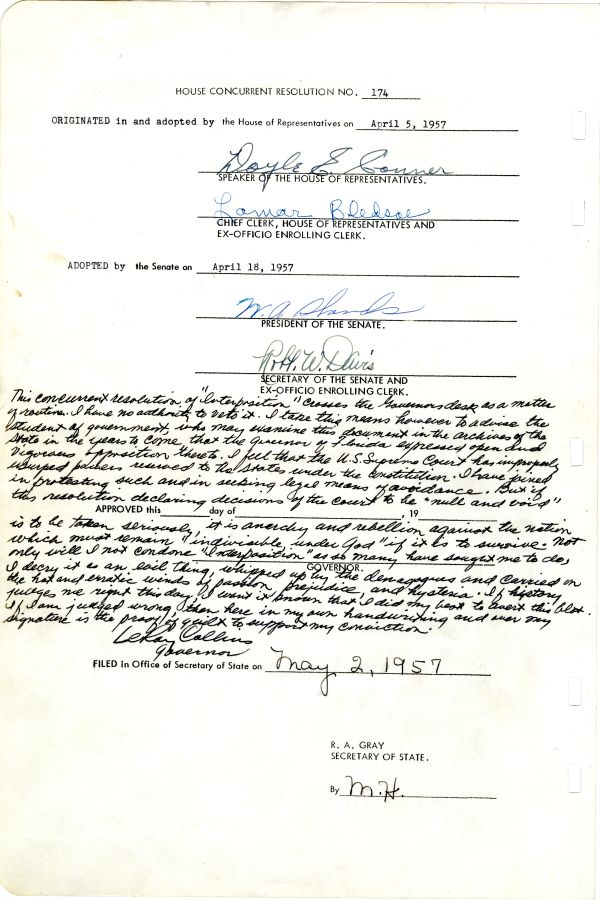Florida Memory is administered by the Florida Department of State, Division of Library and Information Services, Bureau of Archives and Records Management. The digitized records on Florida Memory come from the collections of the State Archives of Florida and the special collections of the State Library of Florida.

State Archives of Florida
- ArchivesFlorida.com
- State Archives Online Catalog
- ArchivesFlorida.com
- ArchivesFlorida.com
State Library of Florida
Related Sites
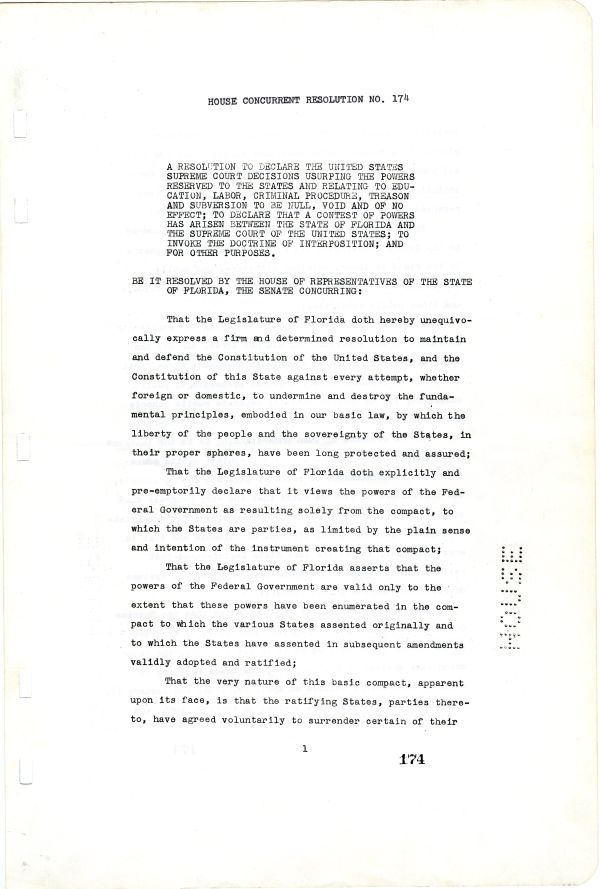
Description of previous item
Description of next item

Interposition Resolution in Response to Brown v. Board of Education, 1957
Source
Description
Date
Contributors
Coverage
Topic
Subjects
Geographic Term
General Note
HOUSE CONCURRENT RESOLUTION NO. 174
A RESOLUTION TO DECLARE THE UNITED STATES SUPREME COURT DECISIONS USURPING THE POWERS RESERVED TO THE STATES AND RELATING TO EDUCATION, LABOR, CRIMINAL PROCEDURE, TREASON AND SUBVERSION TO BE NULL, VOID AND OF NO EFFECT; TO DECLARE THAT A CONTEST OF POWERS HAS ARISEN BETWEEN THE STATE OF FLORIDA AND THE SUPREME COURT OF THE UNITED STATES; TO INVOKE THE DOCTRINE OF INTERPOSITION; AND FOR OTHER PURPOSES.
BE IT RESOLVED BY THE HOUSE OF REPRESENTATIVES OF THE STATE OF FLORIDA, THE SENATE CONCURRING:
That the Legislature of Florida doth hereby unequivocally express a firm and determined resolution to maintain and defend the Constitution of the United States, and the Constitution of this State against every attempt, whether foreign or domestic, to undermine and destroy the fundamental principles, embodied in our basic law, by which the liberty of the people and the sovereignty of the States, in their proper spheres, have been long protected and assured;
That the Legislature of Florida doth explicitly and pre-emptorily declare that it views the powers of the Federal Government as resulting solely from the compact, to which the States ar parties, as limited by the plain sense and intention of the instrument creating that compact:
That the Legislature of Florida asserts that the powers of the Federal Government are valid only to the extent that these powers have been enumerated in the compact to which the various States assented originally and to which the States have assented in subsequent amendments validly adopted and ratified;
that the very nature of this basic compact, apparent upon its face is that the ratifying States, parties thereto, have agreed voluntarily to surrender certain of their
1
174
Title
Subject
Description
Creator
Source
Date
Contributor
Format
Language
Type
Identifier
Coverage
Geographic Term
Thumbnail
ImageID
topic
Subject - Corporate
Subject - Person
Transcript
HOUSE CONCURRENT RESOLUTION NO. 174
A RESOLUTION TO DECLARE THE UNITED STATES SUPREME COURT DECISIONS USURPING THE POWERS RESERVED TO THE STATES AND RELATING TO EDUCATION, LABOR, CRIMINAL PROCEDURE, TREASON AND SUBVERSION TO BE NULL, VOID AND OF NO EFFECT; TO DECLARE THAT A CONTEST OF POWERS HAS ARISEN BETWEEN THE STATE OF FLORIDA AND THE SUPREME COURT OF THE UNITED STATES; TO INVOKE THE DOCTRINE OF INTERPOSITION; AND FOR OTHER PURPOSES.
BE IT RESOLVED BY THE HOUSE OF REPRESENTATIVES OF THE STATE OF FLORIDA, THE SENATE CONCURRING:
That the Legislature of Florida doth hereby unequivocally express a firm and determined resolution to maintain and defend the Constitution of the United States, and the Constitution of this State against every attempt, whether foreign or domestic, to undermine and destroy the fundamental principles, embodied in our basic law, by which the liberty of the people and the sovereignty of the States, in their proper spheres, have been long protected and assured;
That the Legislature of Florida doth explicitly and pre-emptorily declare that it views the powers of the Federal Government as resulting solely from the compact, to which the States ar parties, as limited by the plain sense and intention of the instrument creating that compact:
That the Legislature of Florida asserts that the powers of the Federal Government are valid only to the extent that these powers have been enumerated in the compact to which the various States assented originally and to which the States have assented in subsequent amendments validly adopted and ratified;
that the very nature of this basic compact, apparent upon its face is that the ratifying States, parties thereto, have agreed voluntarily to surrender certain of their
1
174
sovereign rights, but only certain of these sovereign rights to a Federal Government thus constituted; and that all powers not delegated to the United States by the Constitution, nor prohibited by it to the States, have been reserved to the States respectively, or to the people;
That the State of Florida has at no time surrendered to the General Government its right to exercise its powers in the filed of labor, criminal procedure, and public education, and to maintain racially separate public schools and other public facilities;
That the State of Florida, in ratifying the Fourteenth Amendment to the Constitution, did not agree, nor did the other States ratifying the Fourteenth Amendment agree, that the power to regulate labor, criminal proceedings, public education, and to operate racially separate public schools and other facilities was to be prohibited to them thereby;
And as evidence of such understanding as to the inherent power and authority of the States to regulate public education and the maintenance of racially separate public schools, the Legislature of Florida notes that the very Congress that submitted the Fourteenth Amendment for ratification established separate schools in the District of Columbia and that in more than one instance the same State Legislatures that ratified the Fourteenth Amendment also provided of systems of racially separate public schools;
That the Legislature of Florida denies that the Supreme Court of the United States had the right which it asserted in the school cases decided by it on May 17, 1954, the labor union case decided on may 21, 1956, the cases relating to criminal proceedings decided on April 23, 1956, and January 16, 1956, the anti-sedition case decided on April 2, 1956, and
2
174
the case relating to teacher requirements decided on April 9, 1956, to enlarge the language and meaning of the compact by the States in an effort to withdraw from the States powers reserved to them and as daily exercised by them for almost a century;
That a question of contested power has arisen; the Supreme Court of the United States asserts, for its part, that the States did in fact prohibit unto themselves the power to regulate labor matters, criminal proceedings and public education and to maintain racially separate public institutions and the State of Florida, for its part asserts that it and its sister States have never surrendered such rights;
That these assertions upon the part of the Supreme Court of the United States, accompanied by threats of coercion and compulsion against the sovereign States of this Union, constitute a deliberate, palpable, and dangerous attempt by the Court to prohibit to the States certain rights and powers never surrendered by them;
That the Legislature of Florida asserts that whenever the General Government attempts to engage in the deliberate, palpable and dangerous exercise of powers not granted to it, the States who are parties to the compact have the right, and are in duty bound, to interpose for arresting the progress of the evil, and for maintaining, within their respective limits, the authorities, rights, and liberties appertaining to them;
That failure on the part of this State thus to assert its clear rights would be construed as acquiescence in the surrender thereof; and that such submissive acquiescence to the seizure of one right would in the end lead to the surrender of all rights and, and inevitably to the consolidation of the States into one sovereignty, contrary to the sacred compact by which this Union of States was created;
3
174
That the question of contested power asserted in this resolution is not within the province of the Court to determine because the Court itself seeks to usurp the powers which have been reserved to the States, and, therefore, under these circumstances, the judgment of all of the parties to the compact must be sought to resolve the question. The Supreme Court is not a party to the compact, but a creature of the compact and the question of contested power should not be settled by the creature seeking to usurp the power, but by the parties to the compact who are the people of the respective States in whom ultimate sovereignty finally reposes;
That the Constitution of the State of Florida provides for full benefits to all its citizens with reference to educational facilities and under the Laws of Florida enacted by the Legislature through the Minimum Foundation Program its citizens under states' rights, all are being educated under the same general law and all teachers are being employed under identical educational qualifications and all are certified by the State Board of Education alike, which enables the people, themselves, in Florida to provide an educational establishment serviceable and satisfactory and in keeping with the social structure of the state. The people of Florida do not consent to changing state precedents and their right by having doctrines thrust upon them by naked force alone, as promulgated in the school cases of May 17, 1954, and May 31, 1955;
That the doctrines of said decisions and other decisions denying to the States the right to have laws of their own dealing with subversion or espionage, and criminal proceedings, and denying the States the right to dismiss individuals from public employment who refuse to answer questions concerning their connections with communism by invoking the Fifth Amendment, and denying the States the right to provide for protective "right to work" laws, should not be forced
4
174
the citizens of this State for the Court was without jurisdiction, power or authority to interfere with the sovereign powers of the State in such spheres of activity.
That the Court in its decisions relating to public education was without jurisdiction because (1) the jurisdiction of the Court granted by the Constitution is limited to judicial cases in law and equity, and said cases were not of a judicial nature and character, nor did they involve controversies in law or equity, but, on the contrary, the great subjects of the controversy are of a legislative character, and not a judicial character, and are determinable only by the people themselves speaking through their legislative bodies; (2) the essential nature and effect of the proceedings relating exclusively to public schools operated by and under the authority of States, and pursuant to State laws and regulations, said cases were suits against the States, and the Supreme Court was without power or authority to try said cases, brought by individuals against States, because the Constitution forbids the Court to entertain suits by individuals against a State unless the State has consented to be sued;
That if said Court had had jurisdiction and authority to try and determine said cases, it was powerless to interfere with the operation of the public schools of States, because the Constitution of the United States does not confer upon the General Government any power or authority over such schools or over the subject of education, jurisdiction over these matters being reserved to the States, nor did the States by the Fourteenth amendment authorize any interference on the part of the Judicial Department or any other department o the Federal Government with the operation by the States of such public schools as they might in their discretion see fit to establish and operate;
5
174
That by said cases the Court announces its power to adjudge State laws unconstitutional upon the basis of the Court's opinion of such laws as tested by rules of the inexact and speculative theories of psychological knowledge, which power and authority is beyond the jurisdiction of said Court;
That if the Court is permitted to exercise the power to judge the nature and effect of a law by supposed principles of psychological theory, and to hold the statute or Constitution of a State unconstitutional because of the opinions of the Judges as to its suitability the Sates will have been destroyed, and the indestructible Union of Indestructible States established by the Constitution of the United States will have ceased to exist, and in its stead the Court will have created, without jurisdiction or authority from the people, one central government of total power;
That implementing its decision relating to public education of May 17, 1954, said court on May 31, 1955 upon further consideration of said cases, said; "All provisions of Federal, State, or local law....must yield" to said decision of May 17, 1954; said Court thereby presuming arrogantly to give orders to the State of Florida;
That it is clear that said Court has deliberately resolved to disobey the Constitution of the United Stated, and to flout and defy the Supreme Law of the Land;
That the State of Florida, as is also true of the other sovereign states of the Union, has the right to enact laws relating to subversion or espionage, criminal proceedings, dismissing public employees who refuse to answer questions concerning their connections with communism
6
174
and "right to work" protection, and has the right to operate and maintain a public school system utilizing such educational methods therein as in her judgment are conducive to the welfare of those to be educated and the people of the State generally, this being a governmental responsibility which the State has assumed lawfully, and her rights in this respect have not in any wise been delegated to the Central Government, but, on the contrary, she and the other States have reserved such matters to themselves by the terms of the Tenth Amendment. Being possessed of the lawful right, the Stat of Florida is possessed of power to repel every unlawful interference therewith;
That the duty and responsibility of protecting life, property and the priceless possessions of freedom rest upon the Government of Florida as to all those within her territorial limits. The State alone has this responsibility. Laboring under this high obligation she is possessed of the means to effectuate it. It is the duty of the State in flagrant cases such as this to interpose its powers between its people and the effort of said Court to assert an unlawful domination over them; THEREFORE,
BE IT FURTHER RESOLVED BY THE HOUSE OF REPRESENTATIVES OF THE STATE OF FLORIDA, THE SENATE CONCURRING:
Section 1. That said decisions and orders of the Supreme Court of the United States denying the individual sovereign states the power to enact laws relating to espionage or subversion, criminal proceedings, the dismissal of public employees for refusal to answer questions concerning their connections with communism, "right to work" protection, (and relating to separation of the races in the public institutions of a State) are null, void and of no force or effect.
Section 2. That the elected representatives of the people of Florida do now seriously declare that it is the
7
174
intent and duty of all officials, state and local, to observe, honorably, legally and constitutionally, all appropriate measures available to resist these illegal encroachments upon the sovereign powers of this State.
Section 3. That we urge firm and deliberate efforts to check these and further encroachments on the part of the Federal Government, and on the part of said Court through judicial legislation, upon the reserved powers of all the States' powers never surrendered by the remotest implication but expressly reserved and vitally essential to the separate and independent autonomy of the States in order that by united efforts the States may be preserved.
Section 4. That a copy of this Resolution be transmitted by His Excellency the Governor to the Governor and Legislature of each of the other States, to the President of the United States, to each of the Houses of Congress, to Florida's Representatives and Senators in the Congress, and to the Supreme Court of the United States for its information.
8
174
HOUSE CONCURRENT RESOLUTION NO. 174
ORIGINATED in and adopted by the House of Representatives on April 5, 1957
Doyle E. Conner
SPEAKER OF THE HOUSE OF REPRESENTATIVES.
Lamar Bledsoe
CHIEF CLERK, HOUSE OF REPRESENTATIVES AND EX-OFFICIO ENROLLING CLERK.
ADOPTED by the Senate on April 18, 1957
M. A. Shands
PRESIDENT OF THE SENATE.
Robt. W. Davis
SECRETART OF THE SENATE AND EX-OFFICIO ENROLLING CLERK.
This concurrent resolution of 'Interposition' crosses the Governor's desk as a matter of routine. I have no authority to veto it. I take this means however to advise the student of government, who may examine this document in the archives of the state in the years to come that the Governor of Florida expressed open and vigorous opposition thereto. I feel that the U. S. Supreme Court has improperly usurped powers reserved to the states under the constitution. I have joined in protesting such and in seeking legal means of avoidance. But if this resolution declaring the decisions of the court to be 'null and void' is to be taken seriously, it is anarchy and rebellion against the nation which must remain 'indivisible under God' if it is to survive. Not only will I not condone 'interposition' as so many have sought me to do, I decry it as an evil thing, whipped up by the demagogues and carried on the hot and erratic winds of passion, prejudice, and hysteria. If history judges me right this day, I want it known that I did my best to avert this blot. If I am judged wrong, then here in my own handwriting and over my signature is the proof of guilt to support my conviction. LeRoy Collins
Governor
FILED in the Office of Secretary of State on May 2, 1957
R. A. GRAY
SECRETARY OF STATE.
By M. H.
General Note
Chicago Manual of Style
Florida. Legislature. House of Representatives. Interposition Resolution in Response to Brown v. Board of Education, 1957. 1957-05-02. State Archives of Florida, Florida Memory. <https://www.floridamemory.com/items/show/333857>, accessed 26 February 2025.
MLA
Florida. Legislature. House of Representatives. Interposition Resolution in Response to Brown v. Board of Education, 1957. 1957-05-02. State Archives of Florida, Florida Memory. Accessed 26 Feb. 2025.<https://www.floridamemory.com/items/show/333857>
AP Style Photo Citation
(State Archives of Florida/Florida. Legislature. House of Representatives)

 Listen: The Assorted Selections Program
Listen: The Assorted Selections Program